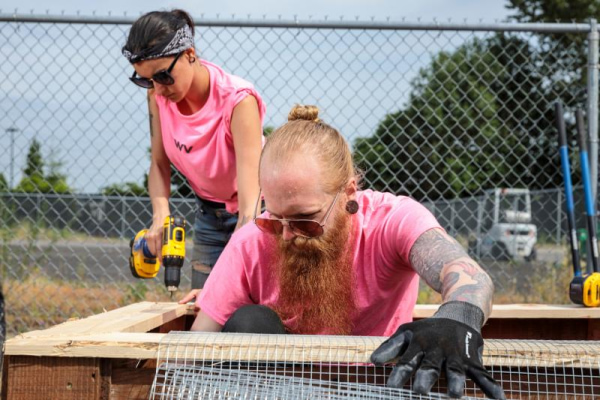Building Solutions in North Portland
In June 2017, a project to provide micro-houses for 14 formerly homeless women opened in Portland's Kenton neighborhood. Called Kenton Women's Village, the project was a team effort of several nonprofit and government agencies. Part of the construction and design of the houses themselves came from students in the Center for Public Interest Design (CPID) in PSU's School of Architecture.
"That's a staggering result - it proved to use that this could work."
Students and faculty also designed the village's shared kitchen and bath facilities, as well as gathering areas, and provided the overall site design and strategy. They led the efforts to improve the village site, such as planting trees, building berms, providing privacy screens on fences, and building stairs into the hillside for easier access.
One of the hurdles in creating the village was getting buy-in from the neighbors. They raised legitimate concerns about having a homeless village in their back yards, but ultimately they approved.
One year later, as a testament to the project's success, the neighborhood association voted 119 to 3 to allow the village to continue. Women from the village also took part in the neighborhood's annual parade, and their float won first place.
"That's a staggering result," says Todd Ferry, senior research associate and associate director of the CPID. "That proved to us that this could work."
Designing and organizing the placement of shelters for the homeless is one of several areas of focus for CPID. Founded by Architecture Professor Sergio Palleroni, CPID performs projects throughout the word, with a mission to address the growing needs of underserved communities.
PSU students engaging in service learning opportunities at the Kenton Women's Village.

In the case of Kenton Women's Village, the sleeping pods – each no larger than 8 by 12 feet – are designed to temporarily house women in need until they are placed in longer-term housing.
Each resident has access to services such as regular meetings with a case worker, employment assistance, access to legal and financial services, mental and physical health care, and support creating and implementing a personalized plan to transition to permanent housing by the time they leave the village.
"In the first year of the village, about 16 women transitioned to permanent housing, far exceeding other transitional housing projects. And that frees up the pods for more people in transition." Ferry said.
It's led the way to other projects for helping Portland's homeless population.
For the fifth year in a row, PSU architecture students and faculty created the stage for the annual Pickathon music festival, and for the second year in a row, after the festival ended, they used materials from the stage to build sleeping pods.
The pods will be part of Clackamas Veterans Village, a project to help homeless veterans. Now under construction, the village will eventually have enough pods to temporarily house 30 residents. Veterans themselves are helping with construction as a way to learn transferrable skills, Ferry says.
Architecture professor Travis Bell was one of the leaders of both the Pickathon stage and subsequent sleeping pod projects.
"In many ways, this is the ideal of sustainability—not just to keep one's use of materials to a minimum, but to find ways to make our use of materials mean more, create more, and actually have a positive social and environmental impact on the world, through innovative design combined with compassion for those in need," said Bell.
The next iteration of the village model is Agape Village in Southeast Portland at the base of Kelly Butte. Spearheaded by Central Nazarene Church, Agape will have many of the same qualities as the Kenton Women's Village. CPID students will help design sleeping pods and make other contributions as the project moves forward.
Meanwhile, CPID graduate students and faculty are working on large scale affordable housing projects in North Portland and Gresham, and CPID fellow Margarette Leite has been leading work to create prototypes for affordable dwelling units (ADUs).
ADUs are one of many creative solutions to address Portland's affordable housing crisis. Homeowners can build them in their backyards, providing a relatively affordable rental. ADUs help people on a tight budget afford housing, and they also help the homeowner. In many cases, the extra income from ADUs can help homeowners keep their own homes rather than moving to something more affordable.
"At the CPID, we recognize that the housing crisis needs to be addressed on a lot of scales," Ferry says.


